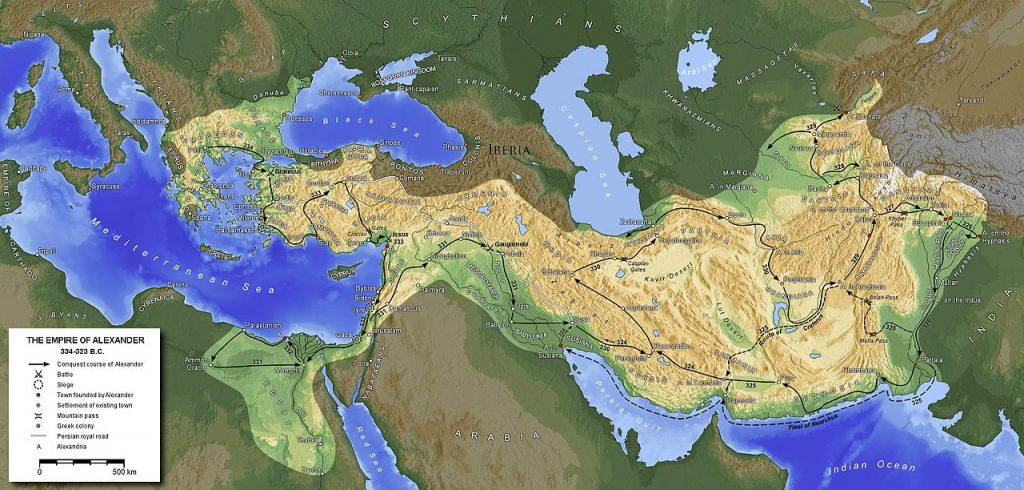In recorded history, countless individuals held the titles of king, and sought to rule and conquer to achieve greatness and prestige. The Kingdom of Macedonia produced two such individuals. These great kings demonstrated awesome military and diplomatic ability that allowed their actions to have profoundly impacted human civilization.1 One king is known to history as arguably one of the greatest conquers of the ancient world, Alexander the Great. The other king was his father, Philip II of Macedonia.2 The rule of Philip II saw the rise of Macedonia from a weak state unto a powerful and influential state that would come to dominate the Greek peninsula. Philip was able to transform his state by reorganizing the military and beginning successful military campaigns.3 A young Alexander had been groomed to one day take reigns Macedonia and he was able to take the legacy created by his father and built upon it. Alexanders military exploits ultimately immortalized himself in history as a legendary figure of great significance.

Philip II rose to the Macedonian throne in 359 BCE. He was twenty-four years of age. Due to the unstable and weak position of Macedonia in his youth, Philip lived as a political hostage in Thebes, where he would learn military strategy and different customs. As a child Philip demonstrated great ability to learn and understand, often said to have been a genius. At the beginning of his reign Macedonia was not a powerful state by any means. It was a divided nation between Upper Macedonia and Lower Macedonia that was governed by sets of powerful families with great influence.4 It possessed a relatively weak and poorly trained army, who mostly fought to survive against invading foreign powers. Macedonia was weak economically and institutionally, and surrounded by more powerful neighbors. It was bordered by the Illyrians to the north, Thrace to the east, and Epirus to the west who often preyed upon the weak nation through invasions and occupation.5
Philip II demonstrated great prowess in military, political, and diplomatic affairs. One of the first actions he took as King was to reorganize the military by increasing the size and therefore power of the Macedonian military, creating the famous Macedonian phalanx and a professional infantry core unit. Phillip demonstrated his diplomatic skill by using the act of marriage to secure numerous alliances, often taking foreign wives.6 Philip, through strategic planning and maneuvering, was able to use his new army to make Macedonia the hegemonic power in Greece through conquest. Upon Philip’s death, Macedonia had conquered Greece and set itself on a trajectory of conquest over much of Asia.7
Alexander was born in July 356 BCE, and was groomed to take the throne. It was said that Alexander was taught physical education by Leonidas and intellectually by Lysimachus of Acarnania, and by Aristotle. He was taught and given Aristotle’s edition of Homer’s works, which he kept as his most valuable possession. He grew to believe in Homeric notion of honor and glory as measurements of personal worth, trying to emulate his heroes Heracles and Achilles. The young Alexander proved to be a great student and demonstrated scholarly skill and interests. His studies came to an end at the age of sixteen, when he was named regent in his father’s absence. Alexander quickly began to showcase his talents as he was able end a revolt. His first military campaign being a success, his father eventually gave him command of the left flank of the Macedonian army, where Alexander continued to achieve military and diplomatic successes.8

Alexander ascended to the Macedonian throne upon the death of his father Philip, who was assassinated before he could launch his campaign to conquer Persia. The young Alexander was twenty-years old. Alexander took reins of his father’s work and set out to achieve success. He fulfilled Philip’s ambitious goal of conquering Asia Minor. In the autumn of 333, Alexander crushed King Darius III of Persia. Alexander had conquered the famed Persian Empire and expanded his empire. With the support of his loyal army, Alexander planned on conquering India, which was only ended by the refusal of his Macedonian troops to continue. Alexander the Great died in Babylon in 323 after falling ill at the age of thirty-three, having never lost a military battle. His legacy, however, continues to influence human history to present day. He is credited with spreading Hellenic culture throughout the areas he conquered.9
- Salem Press Biographical Encyclopedia, 2017, s.v., “Alexander the Great,” by Clark G. Reynolds. ↵
- Edmund M. Burke, “Philip II and Alexander the Great,” Military Affairs vol. 47, no. 2 (1988): 67-70. ↵
- Edward M. Anson, Alexander the Great: Themes and Issues (London: Bloomsbury Pub, 2013., 2013), 43-44. ↵
- Ian Worthington, Alexander the Great : Man and God (Routledge, 2014), 15. ↵
- G. T. Griffith, “The Macedonian Background,” Greece & Rome, vol. 12, no. 2 (1965): 125–26. ↵
- Edward M. Anson, Alexander the Great: Themes and Issues (London: Bloomsbury Pub, 2013), 54. ↵
- Ian Worthington, Alexander the Great : Man and God (Routledge, 2014), 25. ↵
- Ian Worthington, Alexander the Great : Man and God (Routledge, 2014), 36-37. ↵
- Salem Press Biographical Encyclopedia, 2017, s.v., “Alexander the Great,” by Clark G. Reynolds. ↵



42 comments
Christopher Hohman
Nice article. The Macedonian kings sure became very powerful figures. Philip must have learned quite a bit while he was being held captive in Thebes. His achievements in Macedon should not be over looked. However, Alexander was the one of the greatest conquerers ever. It is remarkable that he conquered the way that he did. But to die so young one can only wonder what might have been if he had lived a longer life
Noah Bolhuis
It truly is amazing how Philip and Alexander could turn Macedonia from a tiny power into a great empire the the span of a few short decades. The thing that most impressed me was their ability to overcome being invaded and occupied by their three neighboring nations, and be able to over throw them in order to gain their liberty in a sense. This story reminds me almost of early America, being occupied by a much larger and more powerful force, and being able to overcome their oppressive rule and expanded greatly.
Christopher Hohman
Nice article. It is extraordinary how powerful a tiny country like Macedonia became in such a short period of time. Both Philip and Alexander really left their mark on Macedonia and the most of the Mediterranean World after their deaths. One of the most significant achievements of Alexander’s reign was the founding of Alexandria. The city became the capital of Ptolemaic Egypt, and was arguably the greatest city in the world. All because Alexander and the Macedonians conquered Egypt and so many other places
Christopher Vasquez
Alexander the Great and his Father, Phillip, were both blessings to Macedonia. Phillip, when he reigned as king, proved to be the catalyst that would launch the future of Macedonia into Alexander’s hands. After reinventing the military and introducing the phalanx, Macedonia became an instant threat to be wary of. Despite Alexander being so young (16) when he was appointed as regent in his father’s absence, it is impressive to know that, at such a young age, he was able to crush a rebellion; it’s even more miraculous when considering that he was essentially a junior in college when he took the throne from his father. Alexander the Great truly was a genius — he never lost a battle! I wonder if Alexander would have led his troops differently if he did not believe in the Homeric values of honor in battle. In any case, these two figures, especially Alexander, have influenced the world to this day: many of Alexander’s tactics and strategies are still taught and studied in military schools
Miranda Alamilla
Last semester, in my intro to Philosophy course, we lightly discussed the life of Alexander the Great being that he was taught by Aristotle. Alexander the Great was an intellectual man who had extensive knowledge about the existential life and had superior skills in war. A young, fresh hearted, and intellectual man took the throne at 20 years old and it is no doubt that Aristotle had a great impact on the life and knowledge of Alexander the Great.
Alexandra Lopez
The detail provided in this article is just enough to have an insight as to what happened with the Macedonians. Prior to reading this article, I had the basic knowledge of Alexander the Great from high school history courses I took. I learned a lot more about him as I was reading. Knowing now that he gained some of his knowledge from Aristotle makes this article a fascinating read. There’s no doubt in my mind that this fact contributed to the greatness Alexander achieved in his lifetime.
Elias Garza
I remember learning about Alexander The Great in class about a week ago so following along this article was not a problem. In fact, this was a great article in general. I find it interesting that these people were able to be a king and rule people at such a young age and I am here struggling to keep everything together around nearly the same age. I am glad I was born in the era I am in n ow versus the era where empires are being rules by kings.
Constancia Tijerina
Before reading this article I knew who Alexander the Great was but never knew his true background. What I found most intriguing is Alexanders intellectual knowledge and his strong knowledge of war. What I find especially interesting is how he was taught by Aristotle which I believe influenced greatly on Alexanders successful battles through put his life. It’s a shame he had to die at such a young age. Overall this is such a great article and very well written.
Jose Figueroa
I really loved how you emphasized the father/son relationship between King Philip and Alexander the Great. That without both of them working together, they may not have seen the success that they had. My favorite part was reading that Alexander the Great was taught by the famous philosopher Aristotle. It is crazy to see how people and areas you thought never interacted, all tie together when looking at the grand scheme of world history.
Iris Henderson
This story was really well written. It was interesting to learn about Alexander the Great’s educational background, including the fact that he learned some of his knowledge from Aristotle. I wonder is this helped create the great leader that he would come to be. Also, it was interesting to learn that he was only twenty years old when he became leader of the Macedonian’s. That is a lot of power to wield at such a young age, but he certainly managed.